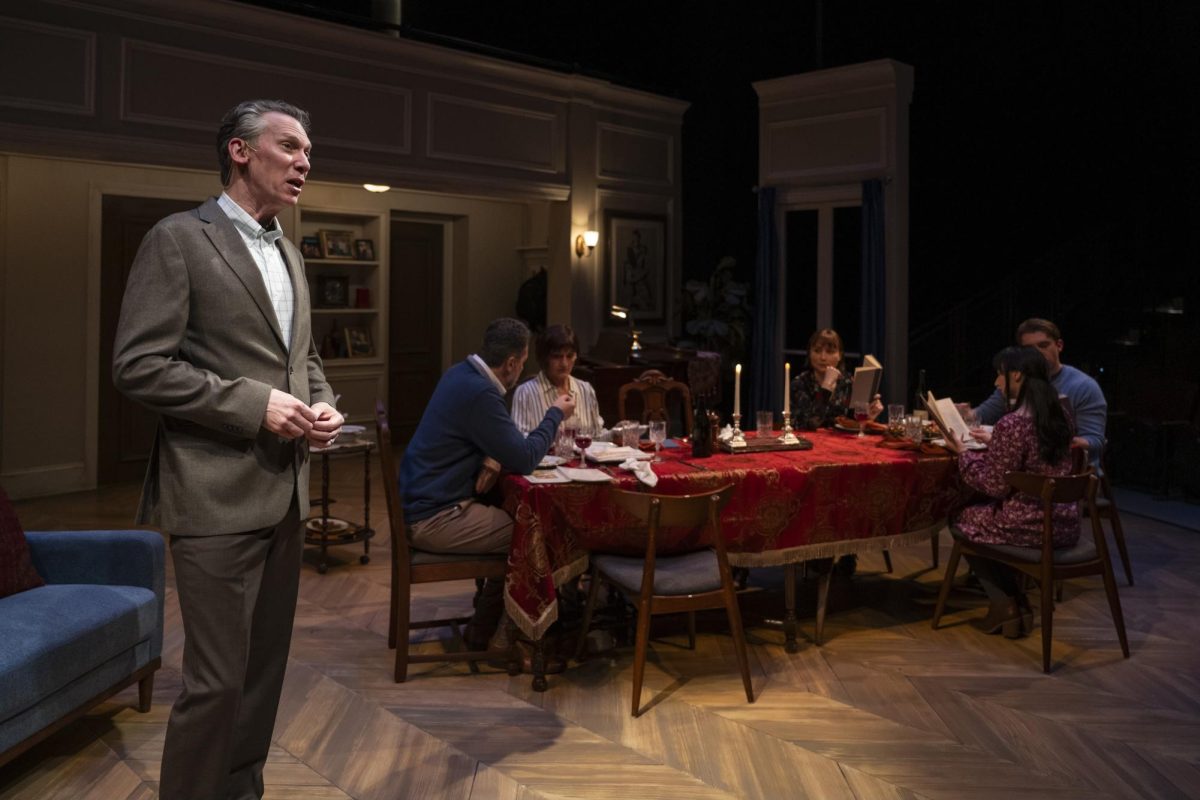In Skokie, Northlight Theatre and Theater Wit’s production of Joshua Harmon’s Prayer for the French Republic is dark in mood, warm in tone, and beautiful throughout. The play, which runs a surprisingly brisk three hours with two intermissions, follows five generations of a Parisian Jewish family as they perennially wrestle with whether they feel themselves safe in France. In 1944, the elderly couple Irma and Adolphe Salomon wait for news of their sons and daughters-in-law, who have been arrested and sent to concentration camps in Poland. And, in 2017, the Salomons’ great-granddaughter Marcelle, her husband Charles Benhamou, and their twenty-something-year-old children Elodie and Daniel contemplate moving their family to Israel. That only one of Irma and Adolphe’s sons—Pierre—survives the war, and that the Benhamous end up leaving Paris for Israel is not the point of Prayer. This is a play about uncertainty and faith in the face of fear.
Prayer’s three acts are each bookended by narration from Marcelle’s brother, the sardonic Patrick (played by a charmingly salesman-like Lawrence Grimm). Patrick pops back up throughout the play, squabbling with Elodie at a Passover seder, playing the piano that is the family’s prized possession, or explaining the long history of European antisemitism. In a lesser play, Patrick’s narration would be a cheap expositional tactic; in Prayer, it is a clever way to pull the audience back in and to orient their viewing of the struggle of French Jewry through an avowedly atheist lens. In all, Prayer is a surprisingly secular play, though do not mistake that to mean this is a play about prejudice, hatred, and community. Prayer has broadly applicable themes, certainly, but it is a play that is heart and soul about the Jewish diaspora.
Prayer is also, crucially for the play’s warmth, about a family that feels real, focusing on their day-to-day life much more than it does on the beliefs for which they stand or the ideas which they debate. There are hints of caricature, but they are few and far between; the characters’ wildly divergent views on how to respond to antisemitism and anti-Zionism develop naturally from fully imagined personalities—a real accomplishment in a play that allows itself to indulge in a number of very philosophical conversations on Israel, God, and the Holocaust.
There is a warmth that permeates Northlight’s production of Prayer, which won the 2022 Drama Desk Award for Outstanding Play during its off-Broadway run. In particular, J. R. Lederle’s lighting design manages to unite soft, robust interior lighting with bizarrely entrancing disco lights, window-shaped gobos, and a massive Eiffel Tower that appears out of a black background above the family’s apartment. Mara Blumenfeld’s costume design is simple yet effective: among a sea of browns, grays, and whites, Elodie, Patrick, and Molly—the play’s three most countercultural figures—stick out. For instance, the manic-depressive Elodie (played sweetly and sincerely by Rae Gray, A.B. ’14) wears a delightful black blouse embroidered with pink, green, red, and white flowers to the play’s climatic seder. And everything about Prayer feels lived-in, from the ease with which Marcelle, Charles, and Patrick yell at each other to the large, well-worn set that includes chairs, tables, a couch, and bookshelves. Characters drink, eat real food, smoke, actually play the piano and a guitar, and roll and cut out real donut dough for Hanukkah.
Alongside Grimm and Gray, Janet Ulrich Brooks excels as Marcelle, the family matriarch and the core around which everyone else in Prayer’s modern-day scenes orients themselves. Brooks switches capably between the practiced outward candor with which Marcelle treats Molly and Elodie and the disorientation she, at times of real vulnerability, shows her husband, brother, and father. Marcelle’s struggle is, in many ways, Prayer’s struggle: How does one know when antisemitism has crescendoed to a point of no return? When does one pick up one’s family and leave? It is shown with the Salomons in 1944 that they waited too long, but that is, of course, far easier to say with hindsight. In 2017 (and in 2025) it is too early to say whether the Benhamous are wise to leave France after Daniel is beaten in the street for wearing a kippah.
Prayer is, in Daniel’s beating—which is among the play’s first scenes—and throughout, deeply dark. It weathers that darkness largely through humor, and this production is wisely unafraid to splice together scenes of death and partying, dread and romance. “A lot of Jews committed suicide to avoid being killed” by Peter the Hermit during the People’s Crusade, Patrick tells the audience at one point. “So we can’t blame Peter for everything.” Prayer is matter-of-fact in its discussions of antisemitism and the Holocaust, and that manages to save even a strange fourth wall break by Irma on the occasion of her passing. Prayer is also, in its quiet insistence on work and secular hope, as much reminiscent of Chekhov’s Uncle Vanya as it is of Stoppard’s Leopoldstadt.
Prayer for the French Republic is not a perfect play; as so many three-act plays do, it drifts and stalls a little in the second act. Nor is this production a perfect production; there’s a touch of cartoonish sappiness in the relationship that develops between Daniel and Molly, and some of the play’s diegetic sounds don’t quite come from the right place. But this is a play full of life, and life is imperfect. In those little moments of beauty interspersed in between bloody handkerchiefs and discussions of Marine Le Pen—where a disco bar appears out of the darkness or where Daniel pops up on a balcony above the stage singing Bob Dylan—we see the hope that has kept Jews alive for centuries.
Northlight Theatre and Theater Wit’s production of Joshua Harmon’s Prayer for the French Republic is at Northlight Theatre through May 11.









